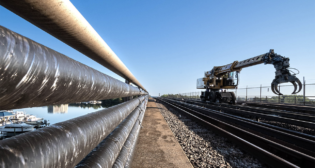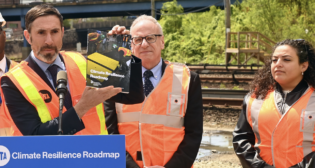
Conversation with Denver RTD Chief of Police and Emergency Management Dr. Joel Fitzgerald Sr.
Written by Denver Regional Transportation District Communications and Engagement Office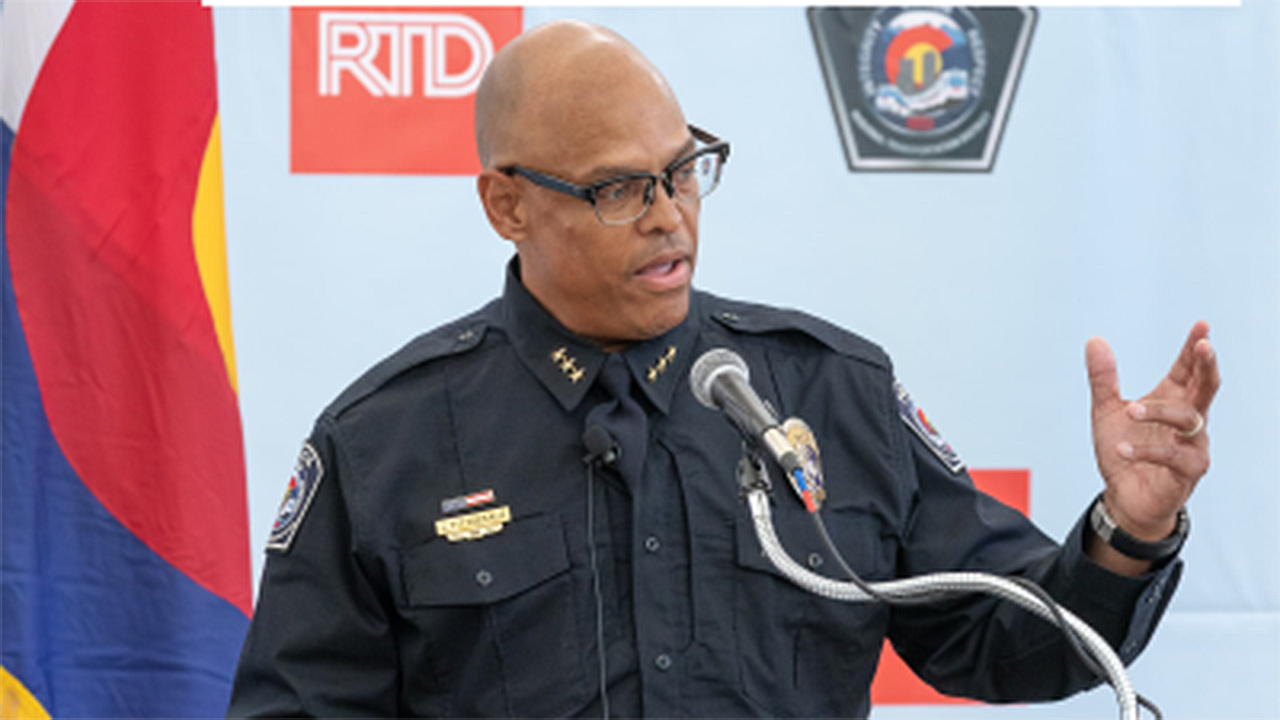
RTD’s newest Chief of Police and Emergency Management, Dr. Joel Fitzgerald Sr., joined the agency in August 2022 and carries primary responsibility for customer safety and security across the eight counties and 40 cities of the Denver metro region in which RTD operates. He holds three decades of law enforcement experience and has served as police chief in four U.S. cities. The chief position at RTD is his first with a transit agency.
Having had some time to settle into his new position, Fitzgerald agreed to take part in a wide-ranging interview exploring many topics of interest to the public, including structural changes being made to the Police Department, issues and opportunities across the RTD system, and safety at this point in the pandemic.
At the time of this conversation, you are closing in on three months as Chief of Police and Emergency Management with RTD – your fifth appointment to such a role, and your first in transit. What have you observed during that time? How do the challenges and opportunities in the Denver metro region compare to those in other communities where you have served?
It is distinctly different, because prior to my hire in RTD there’s not been a dedication to a full-service Police Department, in lieu of utilizing contracted security. That meant the organization had to rely upon the behaviors and attentiveness of people who are contracted to us, as opposed to our own employees, many times handling critical and dangerous crisis situations. You’ve seen in our nation how just the slightest interaction with someone in crisis, with someone facing addiction problems or, let’s say, a juvenile who’s out of control, can lead to a bad result for everyone involved. Being able to deescalate situations, and do so in a manner that’s highly professional, is an expectation that most transit agencies across our country have understood requires trained police, and we’re no different here in Denver. We’re transitioning to a full-service, full-time Police Department with proper staffing, and that’s been difficult for some, even within RTD, to embrace. Some have seen expansion of RTD PD as focusing no longer on the entirety of the agency, but that is not true.
The safety and security of RTD employees and everyone who takes advantage of our transit environment should be of paramount importance to every employee. Better positioning ourselves in the safety environment to be a transit system that people feel safe on and that is monitored correctly is important. This is something that I hear from customers, people on trains and using our implements of transportation, or just walking around Union Station, after committing resources down there that traditionally have never been invested. Folks are saying the environment is better, and that’s a step in the right direction. But it also should resonate with all stakeholders, including our employees, that you can expect better public safety conditions. Expect for RTD PD to take a more prominent role in the safety environment, and RTD employees should expect to be able to do their jobs and not be the subject of random assaults.
The department’s public safety action plan notes that RTD General Manager and CEO Debra A. Johnson has authorized hiring 45 more sworn police officer positions, to add to the 18 sworn positions already in place. This is part of a broader plan to hire 200 police officers by 2024 and rely less upon contracted security officers and off-duty officers from local police departments. What goals have you identified in deploying staff differently as part of this new, decentralized approach, and what will such a change mean to RTD customers and the broader public?
Let’s look at it from the decentralized perspective. Unlike other departments in RTD, we weren’t even co-located in the same environment – and we aren’t now, but we will be shortly. The majority of RTD police officers report for work at District Shops, but have never had locker rooms, work areas, etc. You have police administration reporting for work in our Blake Street facility, and that separation can lead to a lack of communication and strategic impediments. Some may say, “We have Microsoft Teams, and in the post-COVID-19 era, we can log into Teams and tell people what to do,” but there is absolutely no substitute for being co-located, working face-to-face with people whom you see physically every day, and that you’re able to casually communicate with. I think that’s going to help us with high performance in the long run.
We have 18 filled positions and are down four officers, one corporal and one lieutenant. We have five people teed up for hire as police commanders. We also have approximately 30 sworn officers teed up for hire, 15 of whom are now moving through our hiring process. Debra (Johnson, RTD’s General Manager and CEO) challenged me to recruit and staff, and in a terrible environment for recruiting police officers, this department is performing admirably. At least for now and for the near future, as our security contract with Allied Universal Security remains unfulfilled, I decided to leverage the difference of monies that we have obligated to meet that agreement to hire new RTD officers. That totaled approximately $8 million in salary savings and penalties that we assessed to Allied for not being able to execute their end, but more importantly, denied our stakeholders the additional public safety staff intended to protect the system. We have, in short, better positioned RTD PD for the long-term, to function as a full-service law enforcement organization.
All RTD department heads are aware that pursuant to the peer review that APTA (the American Public Transportation Association) completed in 2021, the creation of a full-time Police Department and infrastructure changes were recommended. Debra pulled the trigger on those recommendations based upon informed national pundits in the transit policing industry who said RTD can do a better job by expanding police staffing and transitioning to an accredited police department. They recommended strategies that we’ve already put into place, changes that enhance expectations from this department and RTD. It’s not going to be without its challenges, so the important message is that we will need support, flexibility and cooperation to fully execute her direction.
Where have you focused your time and effort in these initial weeks? What priorities are emerging? How are these shaping your plans for the future of RTD’s Transit Police department?
Everywhere. Whether it is recruiting diverse and experienced individuals to become RTD police officers, screening candidates for commander positions, breaking down interdepartmental silos, or assessing deployment or evidence-based strategies, I have been busy. Since I have crime plan experience in other cities, I identified deficiencies in our system, for example, the lack of commitment of physical police resources at Union Station, an area I quickly addressed.
A legitimate plan to restore a code of conduct that we can all be proud of is taking shape, and we’ve put a lot of resources downtown to initiate the change we want to see in the entire system. I made that change because in the past we were playing, as I put it, Whac-A-Mole. A problem, or series of problems, would occur anywhere across the system, we’d dedicate a ton of resources to address them, and we wouldn’t completely solve the problem. We might address it over the short term, but it would reoccur, sometimes within a week.
In November 2022, we take a systematic and evidence-based approach. Our charge is, let’s win the war and backfill those areas to create stability, making sure problems don’t reoccur long-term. For example, in Union Station we’re working with other RTD departments to ensure restrooms are open to customers, remain clean, and are places where you and your child can go without worrying about an assault or someone using fentanyl next to you. The restrooms are staffed on the exterior and checked every 15 minutes or so. We also make sure the Union Station bus terminal closes on time and that people inside the bus terminal understand that it is a transportation hub, and not a hotel; people must now leave immediately upon terminal closure. An important qualifier to these safety enhancements is RTD PD and security doing those things in a timely manner, every day, and with absolute consistency.
Steadiness is everything. If those persons who behave poorly at Union Station both upstairs and downstairs understand that conduct in violation of law or policy will not be tolerated, and we consistently reinforce that aberrant, unlawful behaviors will be met with penalty, then the behaviors and conditions will continue to change in a positive manner. Perhaps the biggest difference between how I lead the organization and maybe how it was led in the past, is that I am less likely to focus on minor problems at some distant locations, because unless we can get our primary areas of concern under control at this point – i.e., Union Station, Civic Center – we will continue fighting uphill and unproductive battles. We know that RTD shares these areas with the city, state or other municipalities, but if we harden our locations and set a new standard for acceptable behavior, it facilitates the collective effectiveness of our collaboration with other law enforcement entities.
While moving forward, the way we remain consistent with that mission is by working through our five new commander positions. They’ll each have one of five expansive coverage areas they’re responsible for, and will have the latitude to create their own unique plans to both solve problems and prevent them from reoccurring. This approach is one that I’ve tested over 13 years as a police chief, by placing the trust in and ownership upon people who can move the needle. Our deputy chiefs and commanders have the flexibility and commensurate level of authority to modify deployment and to hyperfocus, in many ways like we’re doing now in Union Station (and downtown). They will serve as integral pieces in reestablishing how we do business across the region. I’m famous for saying “Inspect what you expect,” so I expect that our sworn folks and security will both pay attention to what’s going on and change the overall behavioral standards on the RTD system.
In the second part of our conversation with Dr. Joel Fitzgerald Sr., RTD’s Chief of Police and Emergency Management discusses policing RTD stations and properties in the frigid winter months, adding mental health clinicians and a licensed social worker to the team, and his view on the agency’s relationships with groups across the region.
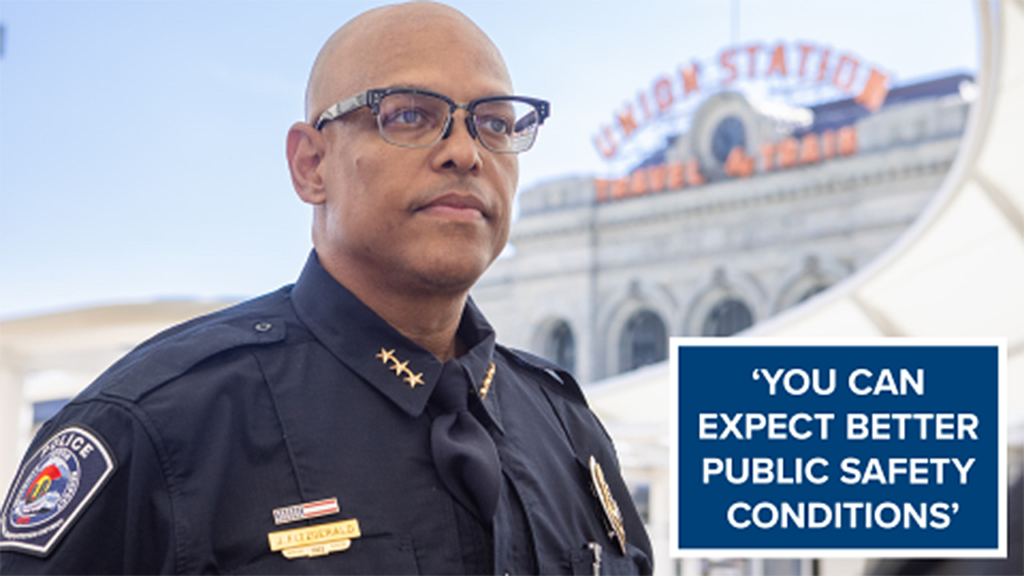
In the most frigid months last winter, higher numbers of people who were not transit customers took shelter from the cold inside busy RTD hubs such as the bus concourse at Union Station. How should police agencies like RTD’s approach such a reality? What plans are being made for these spaces as this winter approaches and in the months beyond?
I think the simple answer is that RTD stations aren’t points where folks should sleep and camp. RTD is a transit agency. We move people. And with moving people, I would suggest that a child or adult or anyone using our services should not have to worry about tripping over people in a bus concourse or being assaulted by someone breaking the law; that’s not what they pay for.
Unhoused circumstances, drug addiction and mental health crises are huge societal problems that disproportionately affect the underprivileged and economically disadvantaged, but we must not lose sight of the fact that we move people. Could we ever claim that we offered the best service if we allowed for those problems to affect you or your family while going to school or to work? It is unfair to think of RTD as the lone adjudicator of a plethora of modern problems, so we are taking a collaborative and empathetic approach to helping those who may not recognize their behaviors negatively affect others. We recognize that no one should walk past persons in need or crisis, or knowingly allow folks to die on the street, but a huge first step is to acknowledge that deeper social issues are not solved by ignoring assaultive or offensive behaviors or opening the bus terminal and allowing it to become a place for people to camp and sleep. As a result, we proactively collaborated with the city and county of Denver to address each of those variables with compassion. We will continue to strive to make the entire system safe for the majority of customers and will enforce the law when it is required.
We provide alternatives for those who require non-punitive resources and will move forward with availing those whom we are able to connect with the same, by limiting their access to massive customer-only areas with controlled physical access changes to infrastructure, or paid fare areas. The gradual introduction of paid fare areas ensures we recognize that those who purchase tickets to be granted access to a particular area have a reasonable expectation – that while using RTD resources, they will encounter others who also paid to use RTD resources. The areas also make it easier to identify those who have not paid, who have previously been the subject of trespass warnings or, more importantly, those in need of access to social service providers before they enter paid areas. We’re going to make every effort to help them.
The public safety action plan calls for adding three mental health clinicians and one licensed social worker to the team next year. Why make this change?
I think that it is very important for us to balance service and safety, so although it’s an expansion in our services, it is not enough. We need mental health clinicians and social service workers in each one of our areas. With five areas covering 2,400 square miles, at least one per area per shift makes sense. RTD can’t be expected to bear that burden alone, so we will need to leverage our relationships with other law enforcement agencies, like we are with Denver, to become more effective regionally. Most people believe that those workers will be put to better use in the Union Station and Civic Center area, but if those areas are no longer central places to gather, people begin to displace, and where do we think that folks are going to go? They’re going to go to the outlying areas throughout the region, so we need to make the same resources accessible, not just in downtown Denver and at Union Station, but in Lakewood, Aurora, Boulder, etc.
The answer to this question again provides support for our area and commander concepts. Ultimately, I do expect us to have clinicians and social workers serving the entire region, and although that is not explained in great length in the short-term, it is a long-term goal of mine because I feel we can do a better job across the region for our customers.
From your own outreach and meetings with the community, what have you learned about RTD’s partnerships and relationships with specific groups across its district? What is going well? Where can improvements be made?
I think what’s going well is that we have the same mindset that our stakeholders have – our stakeholders being our customers; the people who use or are in, around or exposed to RTD facilities and major hubs; the downtown business association; and downtown homeowners. They echo the same sentiment. They collectively agree that we want people in need to get connected to critical resources, but they have been unified in their opinion that people with assaultive behaviors, who violate the law or who affect the safety of those who live, work and play downtown not be allowed to continue to do so. I hate being redundant, but it’s not fair for anyone to be exposed to aberrant behaviors.
Sometimes those behaviors are the results of mental illness or drug misuse, and I understand that. But I also would not want my wife or my child to utilize a paid system, and to then be exposed to anyone else’s bad behaviors. And when that happens and when we allow an environment like that to fester, it’s sort of hard to reclaim it. Everything I have heard from community groups – including the city and county of Denver, who are going to reassign resources to us in the downtown area – is that we understand the plight of folks that are having problems. But we also understand that they’re not representative of all the people who are committing all of the offenses that affect our customers. There are people who prey upon those folks, people who sell drugs, who willfully assault others, who have no regard for the safety and security of not only the transit environment, but the surrounding environment, and they are not authorized to be on our system. In short, folks here have had enough of that and demand changes.
There’s no better time than now to reset the clock under new leadership to dedicate resources where they need to be. And that’s cleaning up our large hubs and moving ourselves outward thereafter, to work with our outlying cities and to develop plans that reduce the incidence of thefts from vehicles (or of catalytic converters), illegal drug use and assaults. Another thing we’ve done differently is disseminating theft from motor vehicle report cards. We’re going through lots, and if one of our officers observes, for example, a car with a laptop or purse sitting on the front seat, we’re issuing a subtle reminder that it’s everyone’s responsibility to harden themselves against crime. We are promoting situational awareness while reinforcing that lots are patrolled. When thieves come into garages and parking lots and they see low-hanging fruit, they go for it, and the ultimate result is they come back because of how easy it was to steal from a location in the first place. So we’re using a visual deterrent, because placing the report cards on cars speaks to our customer; it says that we inspected each vehicle, because many people don’t believe we take the time to do so. It’s positive reinforcement because if you fail one of our inspections, we’re only “grading” you because we don’t want you to be a victim of crime, and you may be more cognizant of that the next time you park. When you harden yourself against crime, it has a net positive effect for the region. The feedback that the other law enforcement agencies get – at least some that I’ve gotten so far – is that it’s a good idea and well worth doing, and it may even help them with some of their theft problems in other lots within their jurisdictions.
We’re promoting the mantra, “How can we best, as an organization, help reduce victimization in our overall service area, and what partnerships can we establish with other departments to help drive crime reduction in our facilities and on our people movers.” We have a responsibility everywhere that we’re at. What we are saying to our partners is expect more of an RTD PD presence, expect more of an interactive relationship, one of ownership in the collective public safety mission.
RTD has experienced an issue in recent months with copper wire theft, affecting rail service. How do we solve that problem? Has anyone been arrested?
I can’t give insight into investigative tools that we use, but we have taken a proactive approach in investigating precious metal thefts and have been integral in making arrests. In the 2,400 square miles that I’m told equates to the size of the state of Delaware, we have been lucky. We realize that significantly more staffing is required, but until that happens, we have been able to leverage resources to our advantage. For instance, we have redeployed Allied staff in an evidence-based manner, placing personnel where crimes are most likely to occur. We are also working to renegotiate the same contract, disentangling duties like staffing second crewmembers on trains to focus more on our mission, overall system security. Until many of the aforementioned topics are addressed, there’s no way we can be expected to be everywhere on a 24-hour basis.
Anything contrary to that is unrealistic, like stopping the rash of 15-second catalytic converter thefts that have plagued our nation. There needs to be stricter laws in place for people that buy or sell metal, period. That’s not a police problem, that’s a legislative and statutory issue that confounds lawmakers across the country. How can those types of things be monitored and enforced? That is not to say that I don’t empathize with those folks who lose their catalytic converters to thefts – I am angry for them. The thieves deserve to be arrested and prosecuted. I would be remiss not to also mention that, pursuant to some of the things we’re doing with technological resources, we have made some headway in that area, but I acknowledge there’s still a long way to go.
When a crime happens, we don’t ignore it and throw our hands up in the air and say, “Hey, we’re getting slammed by thefts again, oh, well.” The collective response is, we have to work together, and we have to work smarter, because criminals are doing so. RTD has a distinct advantage, though: We have operators and repairmen working 24 hours a day who can identify things that may be out of place. Everyone has to be part of the public safety mission; everyone has to contribute if they see someone in areas where they shouldn’t be, or if they observe someone bending down and removing things from our rail lines. If we see theft or odd occurrences, you’re never bothering anyone by calling 911 immediately; even if no arrest is made, it helps us to geolocate crimes. There are far too many people working at RTD for us to not have a lot of internal calls about suspicious behaviors.
In the third and final part of our conversation with RTD’s Chief of Police and Emergency Management, Dr. Joel Fitzgerald Sr. addresses customer concerns that include open drug use on trains and planning for large events. He also shares his thoughts about the experience of using the RTD system for customers who may have been away from it during the pandemic.
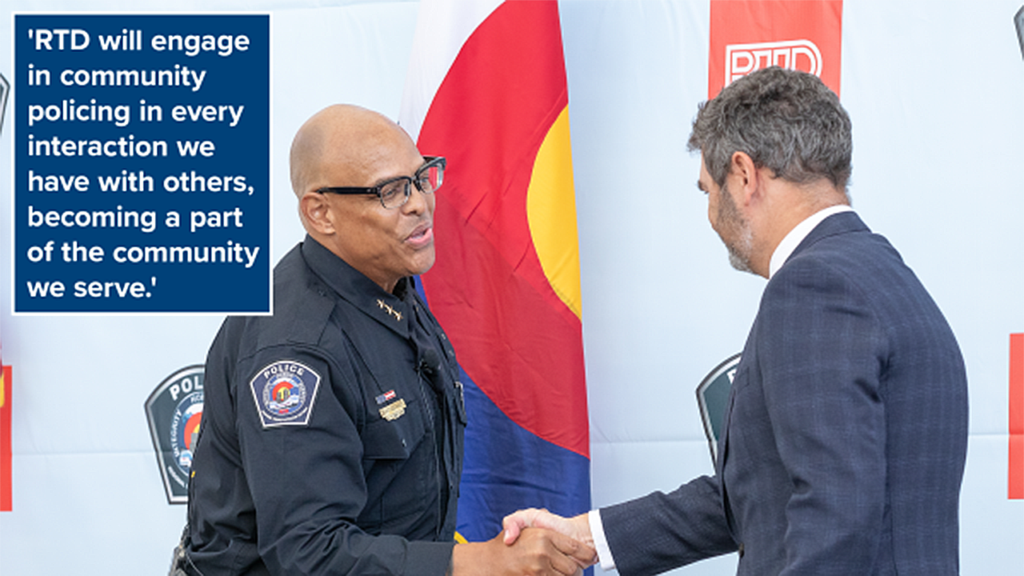
Many customer complaints fielded by RTD’s digital team relate to open drug use on light rail trains and a perceived lack of a police or security presence across our services. What do you want the public to know about how we are addressing these issues?
In increasing the number of sworn officers, we should concurrently increase the level of accountability for behaviors in our system. Each one of the commanders not only serves their respective area but also has lines they’re responsible for. Right now, no one particular supervisor is responsible for addressing problems on individual lines, and that is changing. That comes with the approach I referenced, making people within our department personally responsible to apply evidence-based solutions to problems.
The incidence of drug usage complaints we experience on the system is partially because of the honor system approach that our infrastructure makes conducive. Many of the complaints should never occur, but the reality is we are some time away from paid fare areas, and they happen now. Can we be there all the time? Realistically, we can’t, but if you see it, report it. My hope is that we’re able to get a police officer in there to intervene and to make an arrest, if the offense warrants. Remember, it takes a certain threshold in a narcotics offense to even have someone arrested here in the state of Colorado. As much as we don’t like the fact that narcotics usage occurs in and around those who do not wish to be exposed to that behavior, the amount possessed or being consumed dictates whether an arrest is made. That is the law.
I remind you that some problems are legislative, and others are policing issues. This problem is multifaceted. It is an issue where we stop someone, and whether we have enough of the alleged narcotic to measure and test, and if the stop is legal. Another factor is that, depending upon the level of the offense, that person may just walk away with a citation or nothing. In my opinion, it’s unacceptable – put me in front of a legislative board and I’ll testify to it, I’ll tell them that it’s a ridiculous standard. But I don’t think any customer should have to sit next to someone using fentanyl, meth or heroin, or any narcotic. That’s infringing upon other people’s personal space, and more than not, these folks aren’t people that paid to use the system in the first place. That’s where we come in. The only alternative we have is to understand that paid fare areas are going to be very important measures used to control and mitigate some of the behaviors that we see on the system, but they are not a panacea.
At this point in the pandemic, more people are venturing out to use the RTD system for travel to games, concerts and holiday festivities. What do you want customers to understand about the safety and security planning that goes into events that generate large crowds?
They should know we work collaboratively with Denver and other police agencies in the eight counties that we cover. When there are major events, we attempt to structure the deployment of our collective resources, folks working overtime, those that work for Allied, and those who work for the RTD PD in a manner that provides the most coverage in areas where the highest likelihood for crime exists. We initiate operational plans to work in unison with those other agencies to ensure a safe environment for those people who leverage the convenience of using RTD in lieu of driving to a game, parade or event. The proverbial kitchen sink goes into our planning models.
As I am also the Chief of Emergency Management, it’s important to me that we are always ready to initiate an incident command structure in preparation for any potential issue, whether it is related to terrorism or spree crimes that require immediate responses. We plan, and we train our officers to a standard at or above our brother and sister agencies to ensure that we can adequately respond during any given event.
With safety in mind, what would you say to those individuals who may have used RTD services before the pandemic and are considering whether to return to the system?
I use the system. My family, who visits me very often, also feels comfortable using this public transit system. A safe environment is always dependent upon the added participation of our stakeholders assuming an active bystander role in the public safety mission. We advertise it on all modes of transport, but we don’t want that to exacerbate fears or feelings that when you take public transit, you are risking something. You risk something when you don’t take it and drive yourself home after a vibrant night downtown. You also risk something when you let unfounded fears dictate how you behave.
I encourage families to use RTD because it is a safer, cleaner, more effective mode of transportation. You don’t have to worry about parking. There is a safety presence on the system, and we’re an efficient way of getting from point A to point B. Encouraging folks to ride rests upon how well we do as an organization performing all our duties collectively, whether operator or police officer. Every RTD employee understands that we risk people not wanting to ride when a noteworthy event happens on a bus or train. Therefore, whether they experience employee discourtesy or are victims of crime, we must all remain keenly aware that when one thing happens to negatively affect the customer experience, we must work even harder to ensure it is only a microcosm of how they view RTD. It’s not earth shattering that occasionally, something occurs. It becomes a negative experience when people use RTD services and incidents continues to happen, or they see an operator turn a blind eye. Crime occurs on a very small percentage of our buses and trains, and we are working to reduce that further. Collectively, we’re doing a better job of creating an environment that riders expect, one of safety, cleanliness and security.
We need your help in correcting the narrative, and you can’t help by staying home and not taking public transportation. That’s “biting our nose to spite our face,” so to speak. You have to agree that RTD provides an efficient, effective, on-time offering. Don’t judge the entire organization by the one or two things that you hear may or may not have happened over the course of many days, weeks or even years.
What is your policing philosophy?
I mentioned evidence-based policing and community-oriented policing as foundations for the direction we will take in RTD PD. My job is to make sure we use the data that we’re gathering to make decisions that are in the best interest (and safety) of all stakeholders. We are making a much overdue change to a NIBRS (National Incident Based Reporting Statistics) system of reporting crimes. This aligns our reporting system with Denver and most other law enforcement agencies and provides integrity to our data. In layperson’s terms, it’ll be “apples to apples” rather than our older classifications and categories that aren’t used by other police agencies to report on crime. That’s a step in the right direction in terms of assessing crime through the same lens and adjusting based upon the data, not hunches.
Evidence-based policing is evaluating real, verifiable information, putting police officers in places where they need to be armed with information that helps them do their jobs. Embracing that part of the responsibility means identifying chronic offenders and concentrating on those who drive the occurrence of crime. It does not mean we neglect other issues that may present themselves in the form of some emerging incident or pattern that occurs elsewhere and shifting our focus in that geographical area immediately.
RTD will engage in community policing in every interaction we have with others, becoming a part of the community we serve. When our folks interact with people who may be in need, whether it’s during a crisis, someone struggling with addiction, or someone experiencing an unhoused situation, our officers will attempt to connect them with social service providers. As we connect people with services and we provide them places to stay and alternatives to using illegal substances or going without necessary medications, we conceivably reduce the number of incidents requiring a traditional police response in our public transportation community.
Simply put, my expectation of employees is that we relate better to all people through positive and helpful interactions. We are here to serve. We recognize that we’ve got to brand ourselves differently in the eyes of the community, and that means hiring more RTD police officers, getting those police officers involved in civic events, actively listening to concerns in a problem-solving manner, and challenging all stakeholders to be a part of the law enforcement process by inspecting the behaviors they expect on the system.
Describe yourself in three words.
Integrity is everything.
